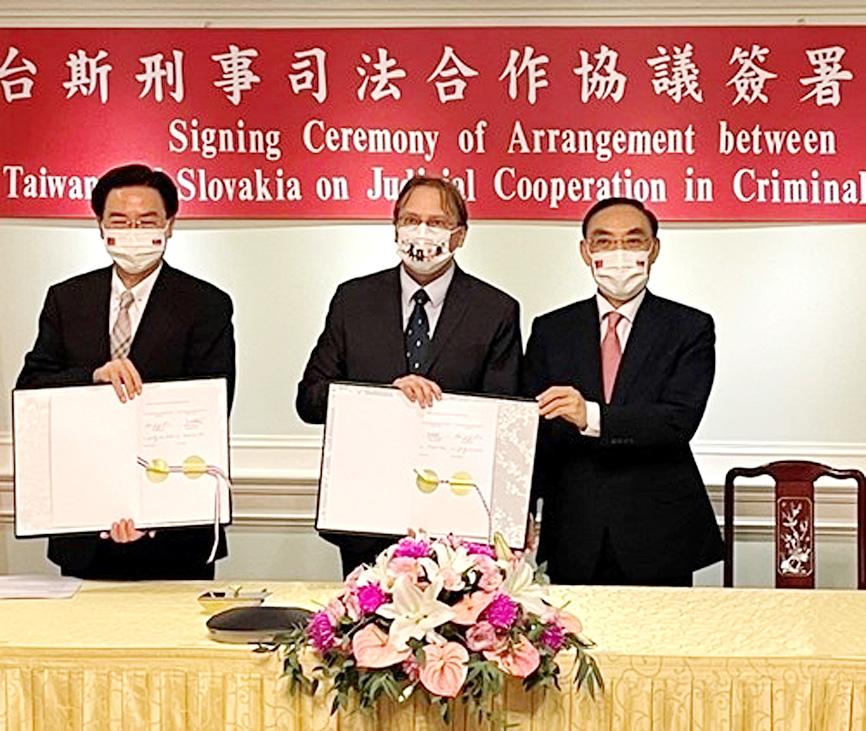Minister of Justice Tsai Ching-hsiang (蔡清祥) yesterday announced the completion of the process to extradite a Polish national back to his country, following the recent signing of a judicial cooperation agreement with Poland, while another similar pact with Slovakia was finalized on Tuesday.
Tsai and other Ministry of Justice officials said that the extradition was another successful case of judicial cooperation with a European country.
According to information from the ministry, Taiwan has made breakthroughs regarding new bilateral agreements on judicial matters, and thus far, has repatriated seven German nationals, one citizen from the UK and one from Denmark, as well as the Polish national, to serve their remaining prison terms in their home countries.

Photo copied by Wu Cheng-feng, Taipei Times
Ministry officials said it was not easy to complete the process for the latest repatriation, as the Taiwan-Poland Criminal Justice Cooperation Agreement required ratification from both sides, and only received the final approval from Polish President Andrzej Duda in January.
Prosecutor Lin Ming-yi (林明誼), who handled the case, told reporters that the Polish national was found guilty in a criminal case and was serving his term in a local prison.
“He did not have much to complain about regarding the prison conditions, as he was placed in a renovated facility specifically for foreign nationals,” Lin said, “The problem was that he does not speak much English, and was unable to communicate with other people. So he kept on expressing his wish to serve the remainder of his prison term back home in Poland.”
Lin said the judiciary made detailed arrangements to facilitate the extradition.
Due to the COVID-19 pandemic, he and other ministry officials could not visit Poland, so they had to communicate via e-mail, Lin said.
The process and discussions helped the Polish government better understand that Taiwan has a good justice system, that both sides can trust each other and can deliver on the promises made, he said.
“It was not easy to make arrangements, because Taiwan in May had a surge in local [COVID-19] infections. It was our job to ensure that all prevention measures and safety guidelines had been followed,” Lin said.
Poland’s judiciary sent three police officers to Taiwan, who had to present negative COVID-19 tests from within three days of boarding their flight, he said.
The ministry fast-tracked their clearance at the airport, provided designated vehicles and drivers, and accommodated them at a quarantine hotel, Lin said, adding that they held meetings with Ministry of Foreign Affairs officials and Poland’s representative office, at which disease prevention measures were strictly adhered to.
Personnel from the Investigation Bureau delivered the Polish national to Taiwan Taoyuan International Airport, and officially handed him over to the three Polish police officers on May 17, as they boarded a flight to Poland, he said.
Earlier on Tuesday, Tsai was joined by Minister of Foreign Affairs Joseph Wu (吳釗燮) and Slovak Economic and Cultural Office in Taipei Representative Martin Podstavek to announce the signing of the Arrangement between Taiwan and Slovakia on Judicial Cooperation in Criminal Matters — the nation’s sixth such mutual legal assistance pact with a European country.
The agreement took four years to complete.

Eight restaurants in Taiwan yesterday secured a one-star rating from the Michelin Guide Taiwan for the first time, while three one-star restaurants from last year’s edition were promoted to two stars. Forty-three restaurants were awarded one star this year, including 34 in Taipei, five in Taichung and four in Kaohsiung. Hosu (好嶼), Chuan Ya (川雅), Sushi Kajin (鮨嘉仁), aMaze (心宴), La Vie by Thomas Buhner, Yuan Yi (元一) and Frassi in Taipei and Front House (方蒔) in Kaohsiung received a one-star rating for the first time. Hosu is known for innovative Taiwanese dishes, while Chuan Ya serves Sichuan cuisine and aMaze specializes

STATS: Taiwan’s average life expectancy of 80.77 years was lower than that of Japan, Singapore and South Korea, but higher than in China, Malaysia and Indonesia Taiwan’s average life expectancy last year increased to 80.77 years, but was still not back to its pre-COVID-19 pandemic peak of 81.32 years in 2020, the Ministry of the Interior said yesterday. The average life expectancy last year increased the 0.54 years from 2023, the ministry said in a statement. For men and women, the average life expectancy last year was 77.42 years and 84.30 years respectively, up 0.48 years and 0.56 years from the previous year. Taiwan’s average life expectancy peaked at 81.32 years in 2020, as the nation was relatively unaffected by the pandemic that year. The metric

Taiwan High Speed Rail Corp. (THSRC) plans to ease strained capacity during peak hours by introducing new fare rules restricting passengers traveling without reserved seats in 2026, company Chairman Shih Che (史哲) said Wednesday. THSRC needs to tackle its capacity issue because there have been several occasions where passengers holding tickets with reserved seats did not make it onto their train in stations packed with individuals traveling without a reserved seat, Shih told reporters in a joint interview in Taipei. Non-reserved seats allow travelers maximum flexibility, but it has led to issues relating to quality of service and safety concerns, especially during

A magnitude 5.1 earthquake struck Chiayi County at 4:37pm today, the Central Weather Administration (CWA) said. The hypocenter was 36.3km southeast of Chiayi County Hall at a depth of 10.4km, CWA data showed. There were no immediate reports of damage resulting from the quake. The intensity of the quake, which gauges the actual effect of a seismic event, measured 4 in Chiayi County, Tainan and Kaohsiung on Taiwan's seven-tier intensity scale, the data showed. The quake had an intensity of 3 in Chiayi City and Yunlin County, while it was measured as 2 in Pingtung, Taitung, Hualien, Changhua, Nantou and Penghu counties, the data